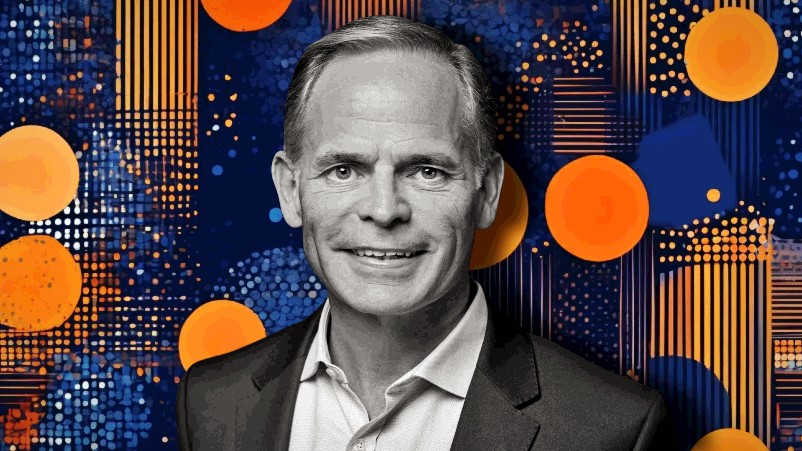Luma Partners CEO Terry Kawaja: 'Creative tech' M&A bonanza incoming; karma police coming for 'hypocrite' Apple on privacy

This is what you get ... Luma Partners CEO Terry Kawaja hopes karma police, or antitrust authorities, catch up with Apple. Meanwhile, he's backing creative tech start-ups to refuel adtech M&A.
Tech investment advisor Terry Kawaja – the man behind the adtech Lumascape – thinks adtech’s lean M&A period might be about to turn, driven by an incoming wave of what he calls “creative tech” start-ups. Canva's $370m acquisition of Leonardo.AI is an early example and Luma Partners, he says, is “one hundred per cent” eyeing potential deals. Meanwhile, he thinks agency arbitrage via principal-based media buying is anything but nefarious. “It’s fine,” per Kawaja. But he doubts it will prop up business models under “encroachment” from all quarters. The holdcos, he suggests, are going to need a bigger tool belt. Kawaja’s also spoiling to fight Apple CEO Tim Cook, at the very least verbally, for hobbling the digital ad industry in the name of privacy while, he claims, using the same data to fuel its own ad business. Apple, per Kawaja, is putting itself in antitrust crosshairs – he hopes it’s next.
What you need to know:
- Terry Kawaja, CEO of New York investment bank Luma Partners, forecasts a boom in “creative tech” as the money moves from optimising media to AI-powered creative effectiveness.
- Canva’s $370m acquisition of Leonardo.AI is an early case in point. Kawaja is “100 per cent” eyeing opportunities within that sphere.
- Meanwhile, he thinks those painting principal-based media trading as “nefarious” are wrong. “It’s fine,” per Kawaja. Financial markets are built on arbitrage and it has a “smoothing” effect, which is net positive.
- But he thinks it won’t solve the business model challenges agencies face – chiefly “encroachment” from all sides.
- Kawaja blames Apple’s privacy pincer rolled out with iOS14 as kneecapping the industry, particularly ecom pureplays and disruptive DTCs now struggling to make unit economics work in the face of soaring customer acquisition costs.
- He claims Apple’s actions, while using the same data to help build its own ad business, place it squarely in antitrust crosshairs – and after Google, thinks it might be next.
I believe that we're going see a new rise of what I'm calling creative tech – not just dynamic creative optimisation ... I'm talking about new tools that are applying data to not marginally improve the efficiency of ad spend, but to actually address the effectiveness of the ads, which is primarily the creative.
Creative tech bonanza?
Adtech M&A has been through a lean period. One of the principal actors, specialist investment bank and advisory, Luma Partners, thinks that might be about to change – especially if Google is forced into a break-up. Luma Partners CEO Terry Kawaja thinks an antitrust guilty verdict could be the best thing for Google and its shareholders – and spur a dealmaking bonanza as adtech “also-rans” sprint in earnest for the scale required to compete with the big walled gardens.
Either way, he spies a new M&A opportunity: creative tech start-ups. Canva's recent move to spend $370m on two-year-old AI image making start-up Leonardo.AI is an early case in point. (Leonardo's admission that it had maxed out on early adopters also adds weight to the argument that 'growth hacking' no longer works in the face of spiralling performance media and customer acquisition costs.)
Kawaja said he’s already working on potential deals.
“I believe we're actually coming to a nirvana where the data and technology, which historically has been applied to other aspects of advertising, is coming to creative,” per Kawaja.
“There’s three components to an ad: there's the media in which it runs, there's the audience to which it's targeted, and there's the creative – and they answer the question, the where, the who and the what.
“There has been hundreds of billions of dollars of investments and deals and activity in and around the first two. We have optimised media. We have optimised audience data to the nth degree in the last 15 years. In creative? Crickets. There has been hardly any technology applied or investment into creative, and I think we're now starting to see that, probably accelerated by AI.”
Creative, “has always been the magic of advertising”, but it’s been “thought of as this manual thing that people do at agencies, low value or low multiple, no operating leverage. Imagine if we can bring a little bit of oomph, little bit of amplification to magic. Now we're talking,” added Kawaja.
“I believe that we're going see a new rise of what I'm calling creative tech – not just dynamic creative optimisation ... I'm talking about new tools that are applying data to not marginally improve the efficiency of ad spend, but to actually address the effectiveness of the ads, which is primarily the creative.”
Are Kawaja and Luma Partners are preparing to invest in this creative tech wave?
“One hundred per cent. I'm seeing some very interesting startups. It's still early days. It's not like a flood … [but] I’ve got my eye on that space,” he said. “I think there's just tremendous upside that will not only benefit, obviously, the target companies, but I think will benefit advertising writ large.”
If you draw the analogy to financial markets, where there's a tonne of arbitrage … the net effect is not a distortive effect. In fact, I would argue that the net effect is a smoothing effect ... I don't view it as nefarious. It's fine.
Agencies vs. principals
Agency group holding companies have moved en masse into principal-based trading – i.e. disclosed arbitrage, where they buy media, becoming the owner of that media inventory, and then on-sell it for profit.
Some analysts see nothing wrong with principal model. “Marketers have basically decided that if they don't want to pay fees for services, because it's so called non-working spend, and they'd rather bundle it in with working spend, well that’s marketers’ prerogative,” Madison and Wall founder Brian Wieser told Mi3 earlier this year. “We can argue about the pros and cons. But collectively they are saying that they kind of accept, if not sometimes prefer, that [arbitrage] model.”
Likewise Kawaja doesn’t see a major problem with the approach. He thinks agencies have little choice, given the squeeze on their business model by tech companies, consultants and just about everybody else.
“They are getting encroached from all sides. Data, ad tech platforms, martech solutions, are encroaching. Publishers are taking studios in house, brands are taking studios and certain functions in house.” The upshot is more pressure on the bottom line. He thinks the current approach is just an extension of the “non value-added, but nonetheless economic margin grabbing” agency trading desks that started springing up 15 years ago.
“In other words, [holdcos] figured out a way to make more money on programmatic and so they all went in that direction. And then quickly they learned, ‘hmm, this is good as an agent, imagine how it could be as a principal!’. Because fragmentation means more opportunity for arbitrage,” per Kawaja.
“So this is not anything new … The leaders on that hit parade of WPP with GroupM, they were early to it, but now Publicis, Omnicom, Havas they're all in it. It's a function of their business model and the negative encroachment of all these technologies and players that has basically forced them to go into [those trading models].”
Does it not distort outcomes? For example, if Amazon appoints WPP and Omnicom, big principal deals are struck and suddenly a lot of their collective clients start spending more on Amazon as a result?
Kawaja sidesteps the question to answer in more general terms.
“If you draw the analogy to financial markets, where there's a tonne of arbitrage … the net effect is not a distortive effect. In fact, I would argue that the net effect is a smoothing effect … Hedge funds, high volume trading, all these firms that get in and take advantage of minuscule differences in timing, data and pricing, have a tendency of smoothing markets,” said Kawaja.
“So I don't look at that as a nefarious or bad thing. It’s a little ironic that the primary business model of an agency is a principal activity. So maybe we need to do something with nomenclature. But I don't view it as nefarious,” he says. “It's fine.”
While principal-based trading revenues might help prop-up earnings, Kawaja thinks holdcos face the same set of challenges they faced a decade ago. He outlined five survival options in 2015 – the fifth of which was to become systems integrators. Kawaja thinks that still holds.
“I said they’ve got to go in that direction, because they're not going to know everything, technology is moving way faster than they can adapt – and at that time [2015] we weren’t even thinking about AI.
“So I think agencies still need to do what it is that they do best – which is represent their clients. But they have to be flexible. They need agility and they could take a cue from the Accentures and the Deloittes of the world that have been more adaptive.
“They should show up into their clients with a big tool belt and say, ‘What do you need? We will represent you regardless of whatever you need. We'll manage it, we'll understand it, we'll organise it, we'll facilitate it,” suggests Kawaja. “That is what an agency should do. They should be an agent.”
Apple comes along and says, ‘we on behalf of consumers who have never complained about privacy, we are going to be their protectorate in this marketplace'. But at the same time, they were ramping up their own ad network … where they use the exact same data to optimise. Where the f*ck do they get off?
Bad Apple?
Kawaja previously told Mi3 that Alphabet shareholders, the adtech industry – and certainly dealmakers like him – would benefit hugely from Google being broken up. But he suspects, and probably hopes, Apple will be trustbusters’ next target. Kawaja blames Apple’s privacy pincer rolled out with iOS14 as kneecapping the industry, particularly ecom pureplays and disruptive DTCs now struggling to make unit economics work in the face of soaring customer acquisition costs.
“It really pisses me off when I hear Tim Cook talk about privacy,” he says of the Apple CEO.
“Commerce is advertising perfected. The goal ought to be to help people buy things. Is that not the point of advertising? You're not getting people interested in a particular brand of watch because you want them interested in that brand of watch – you want them to purchase the watch! So there is nothing negative in perfecting advertising to create a conversion,” suggests Kawaja. Some may beg to differ with his definition of 'perfecting', certainly Apple. But Kawaja sees it as duplicitous.
“All of a sudden Apple comes along and says, ‘we on behalf of consumers who have never said anything, who have never complained about, privacy, we are going to be their protectorate in this marketplace.’”
The upshot of ad tracking transparency, or ATT, was a major loss of signal, or “evisceration of the direct connection between advertising and conversion,” as Kawaja puts it.
“But at the same time, they were ramping up their own ad network … where they use the exact same data to optimise the SKAdNetwork business model [Apple's own measurement and attribution system]. Where the f*ck do they get off with that level of hypocrisy? It is hypocrisy – Tim and come and debate me at my next conference if you think otherwise. It's just unbelievable,” fumed Kawaja. “Apple is ridiculous.”
He thinks the karma police will eventually catch up.
“What Apple is doing, I think is going to put in the crosshairs of antitrust, because that is monopolistic antitrust action," claimed Kawaja. "They're pumping their own ad network while diminishing and deprecating signal to everybody else under the guise of privacy.”


